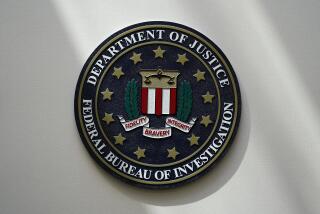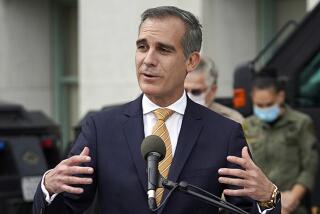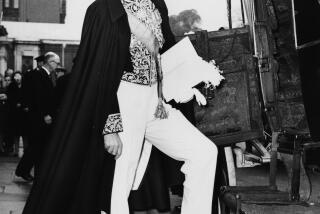Authorized Libya Contacts Denied
- Share via
WASHINGTON — The Reagan Administration, hoping to prevent the Iran- contras scandal from taking a new and damaging turn, Friday vehemently denied published reports that the White House secretly had encouraged former Ambassador William A. Wilson to visit Moammar Kadafi in an attempt to improve U.S. relations with Libya.
White House spokesman Larry Speakes and State Department spokesman Charles Redman, in similar statements, said that no one in the U.S. government authorized Wilson, then U.S. ambassador to the Vatican, to travel to Tripoli in November, 1985, or to meet earlier with other senior Libyan officials.
United Press International, quoting an unidentified senior Administration official, reported that in 1983, William P. Clark, then President Reagan’s national security adviser, authorized Wilson to make overtures to Libya. Long before Wilson traveled to Tripoli, the wire service reported, U.S. policy toward Libya had hardened, but no one thought to cancel the envoy’s instructions.
Rome Newspaper’s Account
The Rome newspaper, La Repubblica, published a similar account. It quoted Antonio Badini, diplomatic counsel to Italian Prime Minister Bettino Craxi, as saying he was told last May by John M. Poindexter, then national security adviser, that Clark had authorized Wilson to contact the Libyans. The reported Poindexter-Badini conversation occurred during the Tokyo economic summit about two weeks before Wilson resigned his post at the Vatican.
The Italian newspaper said that Poindexter told Badini: “It was an error committed when Clark was in my place. So Wilson was authorized to contact the Libyans. It involved an idea born among American businessmen who thought it might be possible to influence Kadafi through business (deals).”
Neither account could be confirmed independently. Clark, reached by telephone in California, denied that he ever gave Wilson such instructions. Poindexter could not be reached for comment. But two sources who spoke to him about the reports said that he also had denied them, although he confirmed that he had spoken to Badini in Tokyo. Wilson did not return telephone calls placed to his Bel-Air home.
Shultz’ Position
Wilson resigned his ambassadorial position May 20, two months after reports surfaced of his Libya trip. At the time, Secretary of State George P. Shultz said that Wilson’s contact with Kadafi was an “embarrassment” to the U.S. government, which was trying to isolate Libya diplomatically in response to Tripoli’s support for international terrorism. Shultz said that Wilson had acted on his own.
Wilson has told friends that his overtures to Kadafi were intended to improve U.S. relations with Libya.
If Wilson, a close friend of the President, had been authorized to contact Kadafi, it would add a new dimension to the already complex Iran-contras controversy. Libya, like Iran, is on the Administration’s list of nations that support terrorism. U.S. warplanes bombed Libya last April because of Libyan complicity in the terrorist bombing of a West Berlin night club in which a U.S. soldier was killed. In the current scandal, the Administration has acknowledged selling arms to Iran in an attempt to cultivate moderate elements in that country.
The State Department learned in 1982--months before the reported authorization by Clark--that Wilson had met senior Libyan officials, although not Kadafi, at various locations in Europe. Lawrence S. Eagleburger, then the department’s third-ranking official, immediately sent Wilson a cable directing him to break off all contact with the Libyans.
Cites Available Evidence
Despite Eagleburger’s instructions, Wilson continued to meet Libyan leaders, officials said. A senior State Department official said Friday that Eagleburger admonished Wilson on the subject “numerous times.”
The official conceded that in the wake of the Iran and contras revelations of the last six weeks, it is impossible to rule anything out, but he said that all of the available evidence indicates that Wilson acted for his own reasons without official approval.
A well informed source said Friday that Clark too had ordered Wilson to break off his contact with the Libyans. The source said that when Wilson failed to heed those instructions, Clark directed Robert C. McFarlane, then Clark’s deputy and later his successor, to contact Wilson personally in Rome and tell him to end the contact.
In a related development, the Turin newspaper, La Stampa, reported that Craxi ordered Italy’s secret service to investigate Wilson’s dealings with Libya. The newspaper reported earlier this week that Italian Foreign Minister Giulio Andreotti said that he was asked by Wilson in November, 1985, to help the U.S. envoy obtain appointments in Tripoli.
More to Read
Sign up for Essential California
The most important California stories and recommendations in your inbox every morning.
You may occasionally receive promotional content from the Los Angeles Times.












